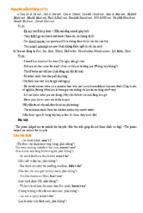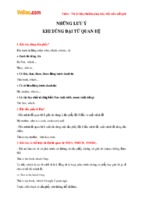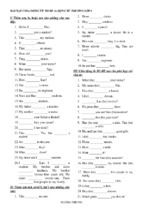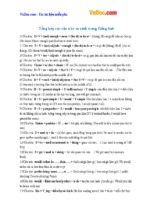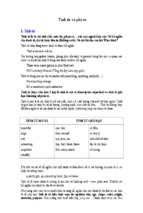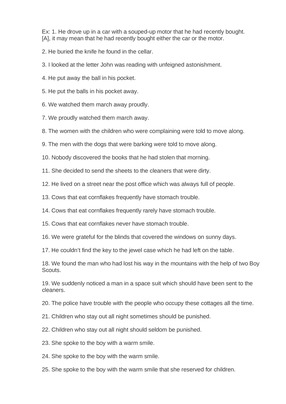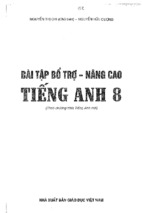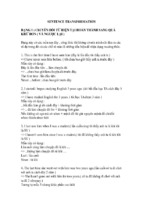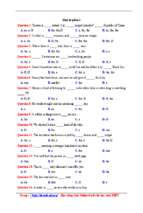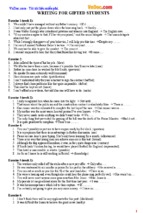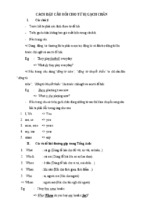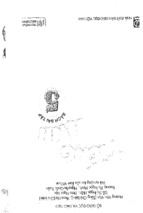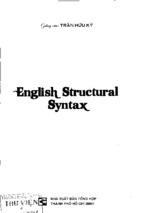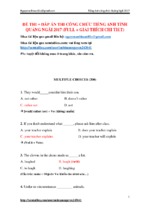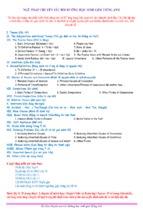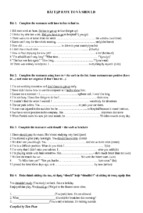Mô tả:
PRESENT PERFECT
1. FORM
(+) S + has/have + Past Participle
(–) S + has/have + not + Past Participle
(?) Has/Have + S + Past Participle? ( Câu hỏi trả lời ngắn - Yes/No question)
Câu trả lời:
Yes, S + has/have.
No, S + has/have + not.
2. Cách sử dụng thì hiện tại hoàn thành trong tiếng anh :
Hành động đã hoàn thành cho tới thời điểm hiện tại mà không đề cập tới nó xảy ra khi
nào.
Ex : I’ve done all my homeworks / Tôi đã làm hết bài tập về nhà
Hành động bắt đầu ở quá khứ và đang tiếp tục ở hiện tại :
Ex: They’ve been married for nearly Fifty years / Họ đã kết hôn được 50 năm. Note : Chúng ta
thường hay dùng Thì hiện tại hoàn thành tiếp diễn cho những trường hợp như thế này : Ex : She
has lived in Liverpool all her life/ Cố ấy đã sống cả đời ở Liverpool.
Hành động đã từng làm trước đây và bây giờ vẫn còn làm
Ex: He has written three books and he is working on another book. Anh ấy đã viết được 3 cuốn
sách và đang viết cuốn tiếp theo
Một kinh nghiệm cho tới thời điểm hiện tại (thường dùng trạng từ ever)
Ex : My last birthday was the worst day I’ve ever had/ Sinh nhật năm ngoái là ngày tệ nhất đời
tôi.
Về một hành động trong quá khứ nhưng quan trọng tại thời điểm nói
Ex : I can’t get my house. I’ve lost my keys. Tôi không thể vào nhà được. Tôi đánh mất chùm
chìa khóa của mình rồi.
3. Dấu hiệu nhận biết thì Hiện tại hoàn thành :
just, recently, lately: gần đây, vừa mới already: rồi before: trước đây ever: đã từng never: chưa
từng, không bao giờ for + N – quãng thời gian: trong khoảng (for a year, for a long time, …)
since + N – mốc/điểm thời gian: từ khi (since 1992, since June, …) yet: chưa (dùng trong câu
phủ định và câu hỏi) so far = until now = up to now = up to the present: cho đến bây giờ
Dạng của động từ Thì hiện tại hoàn thành : Have/has + past participle (qúa khứ phân từ)
- Since + mốc thời gian ví dụ: since 1982, since Junuary….: kể từ khi
- For + khoảng thời gian: for three days, for ten minutes, ….: trong vòng
Ví dụ:
I haven’t heard f-rom her for 2 months.
(Tôi không nghe tin tức gì từ cô ấy trong 2 tháng rồi
He hasn’t met her since she was a little girl.
(Anh ấy không gặp cô ấy kể từ khi cô ấy còn là 1 cô bé.)
- Already: đã
Dùng trong câu khẳng định hay câu hỏi, ALREADY có thể đứng ngay sau have và cũng có thể
đứng cuối câu.
I have already had the answer = I have had the answer already.
Have you typed my letter already?
- Yet: chưa
Dùng trong câu phủ định hoặc nghi vấn. YET thường đứng cuối câu.
John hasn’t written his report yet.
I hasn’t decided what to do yet.
Have you read this article yet?
- Just: vừa mới
Dùng để chỉ một hành động vừa mới xảy ra.
I have just met him.
I have just cleaned up the kitchen.
I have just had lunch.
- Recently, Lately: gần đây
He has recently studied a new theory on maths.
- So far: cho đến bây giờ
We haven’t finished the English homework so far.
- Up to now, up to the present, up to this moment, until now, until this time: đến tận bây giờ.
She hasn’t come up to now.
- Ever: đã từng bao giờ chưa
EVER chỉ dùng trong câu nghi vấn hoặc kết hợp với cấu trúc so sánh nhất
Have you ever gone abroad?
- Never… before: chưa bao giờ
I have never eaten a mango before. Have you eaten a mango?
- In/Over/During/For + the + past/last + time: trong thời gian qua
It has rained in the past week.
She hasn’t talked to me over the last 4 days.
4. Phân biệt “gone to” và “been to”
- gone to: đi chưa về
Ann is on holiday. She has gone to Paris.
–> Có nghĩa là bây giờ cô ấy đang ở đó hoặc đang trên đường đến đó.
- been to: đi về rồi
Ann is back to England now. She has been to Paris.
–> Cô ấy đã từng ở Paris nhưng giờ đã về Anh rồi.
EXERCISE
Ex1: Put the verbs into the correct tense (simple past or present perfect simple).
1.
Mother: I want to prepare dinner. (you / wash)
2.
Daughter: I (wash)
the dishes yet?
the dishes yesterday, but I (have / not)
the time yet to do it today.
3.
Mother: (you / do / already)
your homework?
4.
Daughter: No, I (come / just)
5.
Mother: You (come)
6.
Daughter: Well, but my friend Lucy (call)
home from school.
home from school two hours ago!
and I (finish / just)
when I (arrive)
the phone call.
7.
Mother: (you / see / not)
Lucy at school in the morning?
8.
Daughter: Yes, but we (have / not)
time to talk then.
EX2: Put the verbs into the correct tense (simple past or present perfect simple).
1.
A: I (cycle / just)
50 km.
2.
B: I (cycle)
100 km last week.
3.
A: I (write)
an essay yesterday.
4.
B: I (write / already)
5.
A: I (ring / just)
6.
B: I (ring)
7.
A: Two days ago, I (watch)
8.
B: I (see / already)
two essays this term.
my friend.
my friend 10 minutes ago.
a Madonna concert on TV.
Madonna live in concert.
9.
A: I (spend)
my summer holiday in Australia last year.
10. B: I (be / not)
to Australia yet.
EX3: Put the verbs into the correct tense (simple past or present perfect simple).
1.
A: (you / be / ever)
2.
B: Yes, I (be)
there three times.
3.
A: When (be)
the last time you (be)
4.
B: Last summer. I (spend)
and we (go)
to London?
there?
two weeks in Brighton with my parents
to London one weekend.
5.
(you / like)
it?
6.
Oh yes. We really (have)
a great time in London.
7.
Lucky you! I (be / never)
to London.
EX4: Put the verbs into the correct tense (simple past or present perfect simple).
1.
2.
A: (you / try / ever)
B: Oh, yes!
haggis?
3.
4.
A: How often (you / eat)
B: Two times exactly.
haggis yet?
5.
A: When (you / eat / first)
haggis?
6.
B: That (be)
in 2005. We (have)
a Scottish festival in our town and they also (sell)
traditional Scottish food.
So I (buy)
7.
haggis.
A: (you / like)
it?
8. B: It (be / not)
anything about haggis then.
9.
too bad. And I (know / not)
A: When (you / find out)
?
10. B: When I (be)
in Scotland in 2007. I (go)
to a restaurant and (order)
haggis. Afterwards, the waiter (tell)
me about haggis: it's the heart, liver and lungs of a sheep,
boiled in the animal's stomach. Well, I (eat / never)
haggis again since then.
EX5: Put the verbs into the correct tense (simple past or present perfect simple).
1.
A: (you / play / already)
the new computer game?
2.
B: No, not yet. I only (buy)
it yesterday and I (have / not)
the time yet.
3.
A: (you / go)
to the cinema last night?
4.
B: Yes. I (be)
there with Sue and Louis. (you / be)
to the cinema recently?
5.
A: I last (go)
6.
B: So you (see / not)
to the cinema two weeks ago.
the new action film yet.
7.
A: No, unfortunately not. (you / enjoy)
8.
B: Oh, I really (love)
it?
it. But Sue (like / not)
it - too much action!
9.
A: But why (you / take)
her with you? She (tell)
me last week that she (hate)
action films.
10. B: I think she has an eye on Louis. She (try)
So he (can / concentrate / not)
to flirt with him all the time.
on the film.
EX6: Put the verbs into the correct tense (simple past or present perfect simple).
1.
I (just / finish)
2.
Mary (already / write)
3.
Tom (move)
4.
My friend (be)
5.
I (not / be)
6.
But I (already / travel)
7.
Last week, Mary and Paul (go)
8.
I can't take any pictures because I (not / buy)
9.
(they / spend)
10. (you / ever / see)
my homework.
five letters.
to this town in 1994.
in Canada two years ago.
to Canada so far.
to London a couple of times.
to the cinema.
a new film yet.
their holiday in New Zealand last summer?
a whale?
- Xem thêm -


